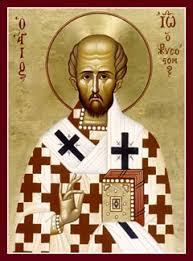This time we’re going to look at 1 How the Orthodox Church deals with Abortions, 2 How should we try to apply Orthodox principles to Society? 3 Being consistently Pro-Life, 4 the Spirit of Judgment.
How the Orthodox Church deals with Abortions
As I understand it, from ancient times the Orthodox Church has handled sin pastorally, not juridically – less concerned with culpability and legal punishment, but rather with helping people overcome sin, getting them back “on the mark”.
In the early Church any who had committed major sin were subjected to a period of “Penance”, a discipline which consisted of exclusion from the sacraments for a period of time. This was applied to all who murdered or killed for any reason. The purpose was not punishment but to establish that the particular sin is an objective evil.
Women who had abortions * were therefore excluded from the sacraments for a period of time. (Were the men who were responsible for  the pregnancy given the same discipline? If not, why not? *) The length of the Penance varied. Saint Basil recommended a few years for soldiers who killed in war, but till death for a woman who had an abortion. (Were either of these carried out in practice?) Saint John
the pregnancy given the same discipline? If not, why not? *) The length of the Penance varied. Saint Basil recommended a few years for soldiers who killed in war, but till death for a woman who had an abortion. (Were either of these carried out in practice?) Saint John  Chrysostom said that the period of Penance for abortion should be ten years, or shorter according to circumstances. **
Chrysostom said that the period of Penance for abortion should be ten years, or shorter according to circumstances. **
* Perhaps because it was chiefly prostitutes who had abortions in order to continue with their “work”?
** I have lost this quote from Chrysostom. Does anyone know where to find it?
How long should the Penance be today? For myself, I believe that our approach should not be absolutist. Lesser evils must always be balanced against greater evils. (Is the taking of human life in abortion always the greatest evil? We have justified the killing of multitudes of innocent people in war – Dresden, Hiroshima, Viet Nam – in order to achieve what was believed to be a greater good.) Likewise I think the Penance regarding abortion should vary according to circumstances. (I speak after 51 years of pastoral experience. “Young priests know the rules. Old priests know the exceptions.”)
Here would be two extreme examples: 1 If it was a wealthy woman who got pregnant when she and her husband could have avoided it, and then they just didn’t want to be bothered with a baby and so had an abortion, then both (I repeat, both mother and father) should be excluded from the sacraments for a long time. 2 If it was a 14 year old girl with mental problems, living in poverty, the pregnancy the result of rape, and the baby seriously deformed, and her life seriously threatened, the period of Penance should be short. Very short.
To repeat: The Church’s discipline is intended not as punishment but simply to make it clear that human life, unborn and born, should be reverenced and protected, not killed.
Alright. That is our discipline within the Church.
How should we apply our Orthodox principles to Society?
This is a different matter. Unlike some other churches, the Orthodox Church does not answer this question for us, does not tell us how to vote. This is a matter for each person’s conscience.
1 Obviously our first work as Orthodox is to maintain the standards of the Church, to set an example to those around us, and to try to win people to Christ and the Church and the Orthodox way of living.
2 Our second job as Orthodox is to teach others the evils of abortion. In addition to what has been said above in this article, I think we need to add the following: 1) Sexual intercourse belongs only within marriage. This idea is almost completely counter-cultural today, and probably unrealistic. But is this not the cause of most unwanted pregnancies? 2) That we agree completely with the claim of some women that they have the right to do what they want with their own bodies. For, unless they were raped, they have the right and choice and responsibility whether or not to get pregnant in the first place – just as men have the choice and responsibility not to get them pregnant. And once a woman is pregnant, the baby living within her is not her own body, and the choice then  is whether or not to kill that unborn person, that unique and irreplaceable human being whom she will have the privilege of carrying and knowing and loving in a way that no one else ever can.
is whether or not to kill that unborn person, that unique and irreplaceable human being whom she will have the privilege of carrying and knowing and loving in a way that no one else ever can.
3 Our next job as Orthodox is to try to reduce the number of abortions, as much as possible. Here there are at least two possible approaches:
1) Some would take the legal approach: we should criminalize abortion, either altogether or at various stages of unborn human development. Or simply reverse Roe v. Wade, and send it back to the states for each of them to litigate again. Simple solution?
2) Some think that making abortion entirely illegal would work rather like prohibition of alcohol once did – not necessarily reduce the number of abortions, but rather drive them underground, and encourage law-breaking and organized crime. (I’m old enough to remember adults talking about the result of Prohibition, the criminalizing alcohol in a society where the majority did not want it criminalized.) Such people would take a more pastoral approach, believing the most effective way is to provide support for poor, desperate pregnant women so that they won’t be so tempted to abortion. *
- As all advanced nations except one (guess which one) now do. In Germany, for example, both parents can have parental leave with salary guaranteed, during the first twelve months after childbirth. Mothers are not allowed to return to work for eight weeks after childbirth.
My opinion on this has changed over the years, and you can easily guess in which way. If any think that criminalizing abortion is going to eliminate abortion and settle the issue, I believe they should think again. I believe that chiefly it will produce a bunch of rich lawyers.
However, both opinions (or any others, or any combination or permutations thereof) may be held by Orthodox in good conscience, so long as the intention is to reduce the number of abortions.
By looking at what has been done regarding abortion in various countries and states, can we demonstrate which way works better? I think not, because abortion-rate statistical comparisons are almost completely unreliable. Why? Because where abortion is legal, the reported abortion rate is probably fairly accurate. But in the few countries where abortion is illegal, most abortions are performed illegally, unreported behind the scenes, and nobody knows how many there are. Partisans on the issue (and there are many) then pick and choose among the statistics to suit their cause – proving nothing. The only stats I think to be fairly consistent are that there are generally far more abortions in poor countries or regions than in wealthy ones. Most stats indicate the the country with the highest abortion rate is… the Russian Federation. * Look it up for yourself.
- which may or may not explain why they seem to place so little on human life elsewhere
Forgive me, but I think I now need to touch briefly on politics. Pardon my cynicism, but for 45 years I have watched many politicians on both sides use the abortion issue as a tool to rile up their “base” and help them get elected. This has led to a lot of yelling and screaming and extreme positions on both sides. One side wants to abolish abortion entirely with little or no concern for supporting poor mothers and babies. The other side wants legal abortion with little or no concern about abortion as a moral issue. After many years in American where abortion has been legal in almost all circumstances, it appears that it could now be made illegal in almost all circumstances.
Pardon my cynicism, but on my bad days, I sometimes feel we’re caught between those who don’t seem to care much about people before they’re born, and those who don’t seem to care much about people after they’re born. The sad result has been that abortion in America has now become chiefly a political legal issue. But abortion is primarily a moral issue.
Even in religious circles, how can it be that many who condemn abortion most vehemently do not seem concerned that their stance against birth control (actually “conception control”) is a major cause of abortions? I just don’t understand.
To repeat, members of the Orthodox Church are allowed to disagree about how to apply Orthodox teaching about abortion or any other moral issue to society.
However, Orthodox teaching is that abortion is a grave evil. Orthodox Christians should never teach that it is morally neutral. Except in the most extreme circumstances, it is not acceptable for a member of the Orthodox Church.
Being Truly Pro-Life
May we try to be consistent? Being Pro-Life involves many matters, not just abortion.
Enormous numbers of innocent lives are also taken in war, creating far  more objective evil than abortion – for those killed are not only unborn babies but “born” babies and their fathers and mothers, leaving countless orphans, and starvation. (Yemen, to date: almost 375,000 people dead.) Such things also result in abortions by poor desperate refugee mothers. (I, an Orthodox priest, have heard confessions.)
more objective evil than abortion – for those killed are not only unborn babies but “born” babies and their fathers and mothers, leaving countless orphans, and starvation. (Yemen, to date: almost 375,000 people dead.) Such things also result in abortions by poor desperate refugee mothers. (I, an Orthodox priest, have heard confessions.)
There are also sins of omission: Human lives are lost when people die for lack of health care. Human lives are lost when people starve to death. Worldwide almost a billion people suffer from malnutrition, and today 20 million more are at risk of starvation because of famine, and annually about 10 million die for lack of food, the majority of them women, some of them pregnant. Human lives are taken day after day by gun and non-gun violence, and by capital punishment. Today the only major nations who still retain the death penalty are the Muslim countries, China and the United States. Either all life is sacred or it is not. May we try to be consistent?
The End
Dear ones, as I said before, this has been a subject very difficult for me to deal with, demoralizing to think about and hard to write about. I’m sure it has been equally distressing for you to read about. Thank you and God bless you for hanging in.
Next Week we begin a happier series on Preparing for Lent.

Father, bless.
We agree very much on this sin, and I must thank you for writing about it, as difficult as it is to dwell on. As a woman who identifies as neither Democrat or Republican, I find it humbling to hear the understanding of an elder priest.
Father,
You make a good point the the man who has impregnated the woman is just as responsible for the conception but is very seldom or ever spoken about. The man should also be treated for the sin of abortion.
As I think about it, perhaps an exception should be made when the man did not want the abortion but the woman went ahead with it anyway. It might depend also on other circumstances, perhaps on whether the baby was conceived irresponsibly outside marriage.
Father bless.
I am glad that you discuss this issue.
I’ve been asked and tell people, that as a Christian I’m pro-life, but for me that is not about abortion alone, that I believe in the sanctity of life, and so healthcare, supports for people in need, support for families with children are all equally important. So too, it means I’m not for war or capital punishment . That said, I have not walked in the shoes of those who choose abortion or want someone dead or went to war; and I pray I never have to. I belive that we look at them with empathy and mercy. So focusing on abortion while ignoring all else is not really pro-life.
I based this view on what I took from a priest in church talked about how the Church does not see any of the situations like these we are faced in this world from a purely legalistic or black or white, but with discernment through prayer and complete submission to God. This is why we are asked to seek the guidance of the priests when faced with these spiritual challengers that also have real world consequences.
I don’t know if this is how I was supposed to interpret what he said, Am I in the right in my understanding of how the Church views these issues?
If not, would you guide me better? How do you respond to someone who challenges you on this view?
Thank you for your time and advice.
Please remember that on many non-dogmatic matters the Orthodox Church has no official statement of our position. We just do it the way we do it because that’s the way we do it. However, I think you understand the general Orthodox approach to these issues correctly.
How to respond to someone who challenges you on this? Good luck! In our divided overly-politicized culture, no matter how you say it, some people (unfortunately including some Orthodox) will misunderstand and assume you are the “enemy” and belong to the “other side”. Just state what we believe calmly without being confrontative, and if they get hostile don’t take the bait. If they refuse to give it up, it may then be better to just quietly walk away. Then pray about it, offer it up and let God take it from there.
I actually had a guy attack me about a political position which he thought I held but did not – at a funeral meal of all places! Three times I told him I didn’t want to talk about it there. Three times he wouldn’t give it up. So finally I did just walk away.
In today’s divided world, I try to avoid ending up in these discussions because I can’t satisfy either side who are limited in their understanding of the issue or open to the others opinion, and agression and outrage seems to reign supreme.
I really enjoyed (for a lack of a better word) reading this piece. This definitely is a difficult topic and you put words to many of my thoughts and the way I think about this. Thank you for sharing!
Father, an excellent article! There are indeed other forms of murder and we should acknowledge them all as being the sin that they are. We are not always consistent at being consistent. One of the faults I have to work on. I seem to remember reading years ago that lower I. Q. women had more abortions and higher I. Q. women used birth control methods more. And it made no difference if she were a stay at home mom or had a career or worked outside the home. Now believe me, I know this can be a touchy issue. I mention this because if this is part of the reason some women have abortions then we need to acknowledge the source of the problem to be able to try to correct it. Low or high I.Q. has nothing to do with salvation so thank God for that. ( I would be in trouble). Maybe low I. Q. causes women to be manipulated by the abortion pushers? The devil does have his influence for a time. Any thoughts and advice? Thank You, Gary
I don’t know any statistics on this. However, this sounds to me like speculation. I can’t imagine that there are accessible records of peoples’ IQs.
I just re-read my post and realized how hard hearted it sounds. I don’t mean it that way at all. I was not saying that all women who have abortions have low I. Q.’s. There are many reasons. Another is that some are pressured by family or friends. And more. Being a man also means I don’t understand even the beginnings of what a pregnant woman goes through. I read an article that pointed out that it was part of the problem. For anyone that I offended I am truly sorry. Please forgive me. Gary